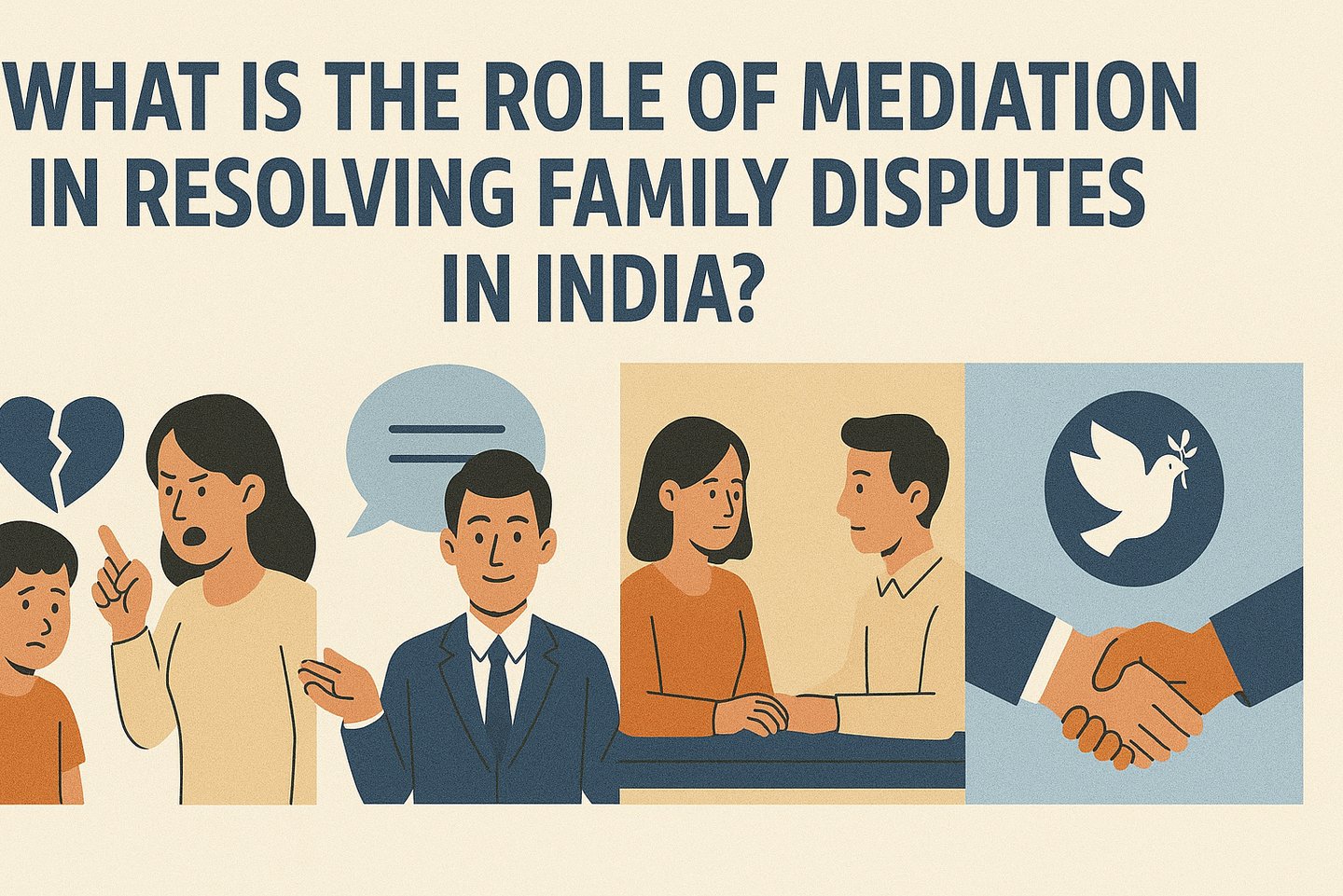What is the role of mediation in resolving family disputes in India?
This article lays down the role of mediation in resolving family disputes in India, while highlighting its legal framework, advantages, and challenges.
FAMILY LAW
Kashish Kapoor
8/6/20253 min read


Mediation is a process in which disputes are settled with the intervention of a third party, called the mediator. The mediator assists parties to the dispute in arriving at a mutually agreed-upon amicable solution. One of the main purposes of mediation is to avoid a lengthy and cumbersome litigation procedure. Moreover, considering the sensitive and delicate nature of family disputes, it is often recommended to opt for a time-efficient and relatively quick mediation process.
Legal Framework of Mediation
In India, the legal landscape is evolving to encourage mediation, particularly for family matters. Section 89 of the Code of Civil Procedure, 1908, empowers the courts to refer cases to the Alternate Dispute Resolution (ADR) mechanism, where they deem fit. This implies that ADR is often regarded as the first choice in suitable cases. In addition, section 9 of the Family Courts Act, 1984, provides that the Family Court shall endeavour to encourage the parties to arrive at a settlement. The section allows the Family Courts to adjourn the proceedings to enable the attempt towards settlement of the dispute. The Parliament enacted the Mediation Act, 2023, to streamline the mediation process. The Act provides a comprehensive framework concerning mediation and mediators’ roles and responsibilities. The Supreme Court in the case of K. Srinivas Rao vs D.A. Deepa [AIR 2013 SC 2176], while highlighting the importance of mediation, observed that it shall be the preferred mode of matrimonial dispute resolution, particularly when there’s a possibility of reconciliation.
Common Family Disputes that are resolved through Mediation
Mediation addresses a number of family disputes. The most common ones include:
i. Divorce: Mediation may allow a couple to arrive at an early settlement rather than going through the divorce proceedings. Divorce procedure, per se, is very emotionally and mentally challenging; therefore, mediation is often chosen as a preferred method before the final decision.
ii. Child Custody: Such disputes tend to be very sensitive as the interests of children are at stake. Mediators may assist the parents to arrive at an amicable solution to serve the best interests of the child, by means such as crafting a mutually accepted co-parenting plan, etc.
iii. Maintenance: A mediator helps parties to assess their financial situations and arrive at a reasonable arrangement concerning maintenance and alimony.
iv. Inheritance and Property Disputes: Family disagreements over inherited property or assets can be complex. Mediation provides a forum for family members and other relatives to discuss their claims and reach an amicable resolution.
No doubt that mediation is a highly effective tool to resolve family disputes; however, it is not a straitjacket solution for all the problems. Family disputes involving mental or physical abuse or violence, or where the safety of one of the parties is in a perilous situation, such instances are not suitable for mediation. The suitability of the case for the mediation process varies from case to case, and the mediator must change the recourse of the parties if he finds any such anomalies in the presented case.
Advantages of Mediation
1. Preservation of Relationships: The process of mediation allows parties to have a ‘win-win’ dynamic rather than the ‘winner-loser’ dynamic, which is often created in litigation. The process encourages open communication that leads to acceptance and compromises from both parties.
2. Confidentiality: Mediation sessions are strictly confidential and private. This creates a safe space for parties to speak openly about their concerns and desires.
3. Speedy: Litigation is a lengthy process, causing a case to stretch for several years. However, in mediation, there is a possibility that parties may arrive at a substantial agreement within the first few sessions, thereby saving a lot of time and energy.
4. Cost-efficient: Legal proceedings are often expensive due to court fees, attorney fees, etc. Mediation is relatively affordable.
5. Party-centric Control: In a courtroom, the final decision lies in the hands of the judge. In mediation, the parties themselves are in control of the outcome. The mediator acts as a facilitator of the conversation. The decision of acceptance of the final agreement lies with the parties. This sense of ownership also results in higher rates of compliance with the final settlement.
Challenges in Mediation
1. Power Imbalances: Even though the process of mediation encourages equal participation but sometimes the internal relations between the parties might cause a power imbalance. This causes the weaker party to accept the unfavourable settlement.
2. Lack of Good Faith Participation: Mediation is a two-way process and requires equivalent compromises from both sides. If one party is firm with their views, the mediation is likely to fail.
3. Non-disclosure of Information: For mediation to be successful, especially in financial matters, both parties must be completely transparent. If one party hides assets or misrepresents their financial situation, any resulting agreement will be based on false information and will likely be unfair.
In conclusion, mediation has gained popularity, especially concerning family disputes. It assists dispute resolution by prioritizing communication, confidentiality, and mutual respect, unlike in litigation, where the relations might be permanently strained due to a challenging environment and prolonged procedure.
